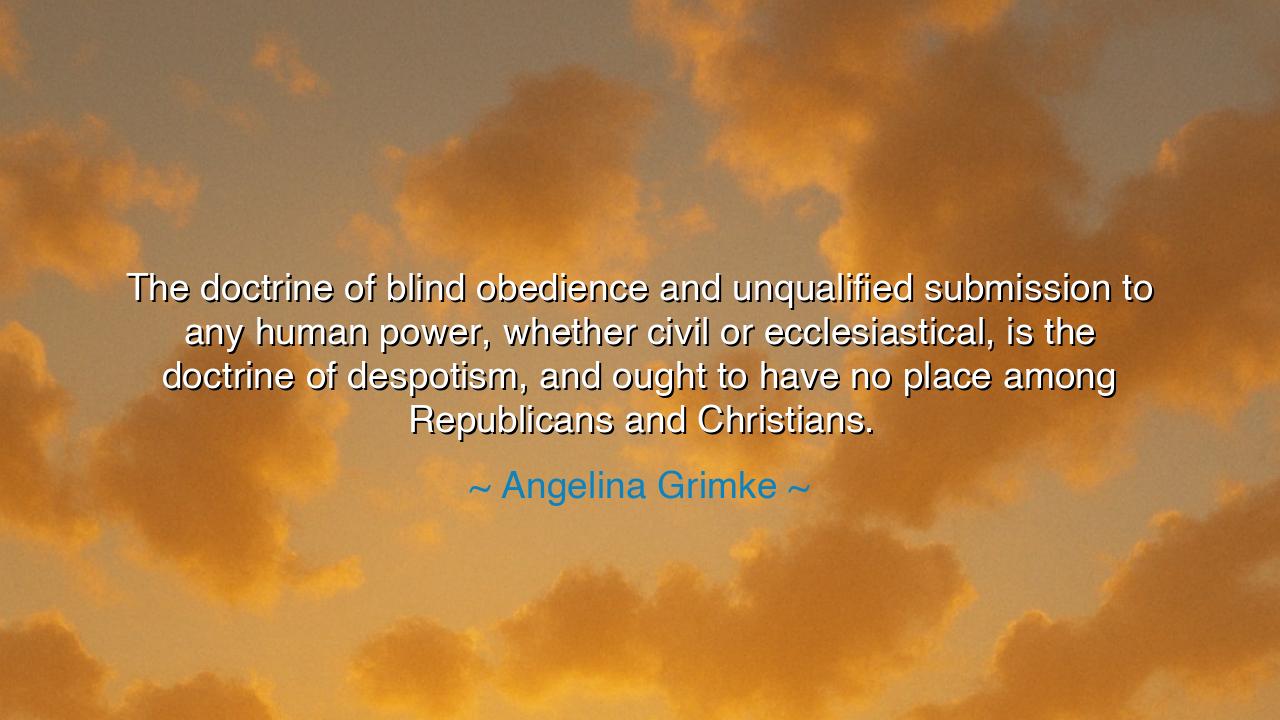
The doctrine of blind obedience and unqualified submission to
The doctrine of blind obedience and unqualified submission to any human power, whether civil or ecclesiastical, is the doctrine of despotism, and ought to have no place among Republicans and Christians.






Hearken, O children of courage and conscience, to the words of Angelina Grimké, who speaks with fire against the perils of blind obedience and unqualified submission. She warns that to surrender wholly to any human authority—be it civil or ecclesiastical—is to embrace the doctrine of despotism, a surrender of reason, virtue, and freedom. Herein lies a teaching for the ages: liberty and conscience are sacred, and no mortal power may claim absolute dominion over the moral judgment of the soul.
The origin of this reflection lies in Grimké’s life as an abolitionist and advocate for justice in early nineteenth-century America. Witnessing the chains of slavery and the complicit obedience of many to unjust laws, she recognized the danger of allowing authority to override conscience. Her words were a call to Republicans and Christians alike: to reject submission that is blind, and to uphold principles of justice and righteousness above fear or custom.
The meaning of this aphorism is profound: true morality and civic virtue require discernment, courage, and the refusal to surrender judgment to power alone. Obedience without reflection is not virtue, but complicity; submission without conscience is not loyalty, but surrender to tyranny. Grimké exhorts all to weigh laws, commands, and decrees against the eternal principles of justice, mercy, and truth.
History provides testament to this teaching. Consider the courage of Sophie Scholl and the members of the White Rose in Nazi Germany, who refused blind obedience to despotism. Though their lives were imperiled, they followed the dictates of conscience over the commands of tyrants, illuminating the moral power of resistance. Their bravery exemplifies Grimké’s principle: the soul’s allegiance to justice surpasses submission to human authority.
Moreover, this teaching resonates in everyday life. Whether in the halls of governance, the pews of the faithful, or the marketplaces of trade, humans encounter authority that tempts surrender. Grimké reminds us that the moral imperative is to question, to discern, and to act with conscience as the ultimate guide. Obedience is honorable only when tempered by reason and principle, for without it, authority becomes oppression, and law becomes tyranny.
O generations yet unborn, take this counsel to heart: guard the sovereignty of your conscience, resist the allure of unqualified submission, and honor the eternal truths that govern justice, mercy, and freedom. For in rejecting the doctrine of blind obedience, you uphold the sacred dignity of the soul, the moral foundation of society, and the enduring light of liberty and righteousness across the ages.






ANanh nhat
This quote leads me to reflect on the ethical responsibilities of both leaders and followers. Are societies more at risk from corrupt rulers or from citizens who obey unquestioningly? I also wonder about the role of education and civic engagement in fostering independent thought. The statement challenges me to consider how communities can promote accountability, critical thinking, and moral courage while maintaining social cohesion and respect for legitimate authority.
NNQuynh Nhu Nguyen
I feel a sense of empowerment reading this, but it also raises difficult questions. How can one determine when obedience becomes harmful or when submission is appropriate? Does the statement suggest that moral discernment should always outweigh institutional authority, and if so, how do individuals navigate the risks involved? It makes me think about modern examples where questioning authority is necessary, and the courage required to stand against unjust power structures.
TCNguyen Trung Chien
This statement sparks curiosity about historical context. What abuses of civil or ecclesiastical power was Grimke addressing, and how did her contemporaries react to her call for resistance to despotism? I also wonder whether the distinction she makes between Republicans and Christians reflects specific ideals of governance and morality. It encourages me to consider how foundational principles of liberty and conscience can be preserved without descending into chaos or anarchy.
HLHomnay Luu
Reading this, I’m struck by the emphasis on personal conscience and moral responsibility. It makes me wonder how individuals today balance respect for authority with critical judgment. Are there modern parallels where blind obedience leads to harm, and how can societies encourage thoughtful dissent? This quote prompts reflection on the tension between loyalty, faith, and ethics, and whether cultivating independent reasoning should be a central value in both political and religious life.